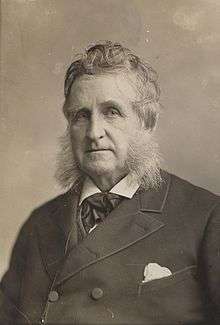Donald Grant Mitchell
Donald Grant Mitchell (April 12, 1822 – December 15, 1908) was an American essayist and novelist who usually wrote under the pen name Ik Marvel.
Donald Grant Mitchell | |
|---|---|
 Donald Grant Mitchell in 1883 | |
| Born | April 12, 1822 Norwich, Connecticut, United States |
| Died | December 15, 1908 (aged 86) New Haven, Connecticut |
| Pen name | Ik Marvel |
| Occupation | Author |
| Nationality | American |
| Genre | Fiction, non-fiction, travel literature, essay, literary criticism |
| Notable works | Reveries of a Bachelor |
Biography
Mitchell, the grandson of politician and jurist Stephen Mix Mitchell, was born in Norwich, Connecticut. He graduated from Yale College in 1841, where he was a member of Skull and Bones and studied law, but he soon took up literature. Throughout his life he showed a particular interest in agriculture and landscape gardening, which he followed at first in pursuit of health.[1] He served as U.S. consul at Venice, Italy, from 1853 to 1854, and in 1855 he settled at his estate, called Edgewood, near New Haven, Connecticut.
He was best known as the author (under the pseudonym of "Ik Marvel") of the sentimental essays contained in the volumes Reveries of a Bachelor, or a Book of the Heart (first published in book form in 1850) and Dream Life, a Fable of the Seasons (1851).[1] Reveries of a Bachelor examines the dream-like lives Americans were living at the time. It was one of the top best sellers of its time but has received little attention from 19th century literary critics. In the text, Ik Marvel theorizes on boyhood, country life style, marriage, travel, and dreaming.
Dream Life, a Fable of the Seasons, was dedicated to Washington Irving, to whom Mitchell was introduced by Lewis Gaylord Clark. Irving said of the dedication: "Though I have a great disinclination in general to be the object of literary oblations and compliments... I have enjoyed your writings with such peculiar relish and have been so drawn toward the author by the qualities of head and heart evinced in them, that I confess I feel gratified by the dedication".[2] Mitchell produced books of travel and volumes of essays on rural themes including Reveries of a Bachelor (1850), My Farm of Edgewood: A Country Book (1863), sketchy studies of English monarchs and of English and American literature, and a character novel entitled Doctor Johns (1866).[1] His other works include About Old Story-tellers (1878) and American Lands and Letters (1897–99).
Reveries of a Bachelor was one of poet Emily Dickinson's favorite books.[3]
Oliver Wendell Holmes, Sr., called him "one of the pleasantest of our American writers."
Bibliography
- Fresh Gleanings, or a New Sheaf from the Old Fields of Continental Europe (1847)
- Battle Summer (1850; originally planned as a two volume work, only the first was published.[4])
- The Lorgnette, or Studies of the Town, by an Opera-Goer (1850)
- Reveries of a Bachelor (1850)
- Dream Life (1851)
- Fudge Doings (1855)
- My Farm of Edgewood (1863)
- Seven Stories (1864)
- Wet Days at Edgewood (1865)
- Doctor Johns (1866)
- Rural Studies (1867; reprinted as Out-of-Town Places in 1884)
- About Old Story Tellers (1877)
- The Woodbridge Record (1883)
- Bound Together (1884)
- English Lands, Letters, and Kings (1889–90)
- American Lands and Letters (1897–9)
Notes
-

- Burstein, Andrew. The Original Knickerbocker: The Life of Washington Irving. New York: Basic Books, 2007: 316. ISBN 978-0-465-00853-7
- Frye, Northrope (1962). Fables of Identity. New York: Harcourt Brace Jovanovich. pp. 193–217. ISBN 0156297302.
- Vincent, Leon (1906). American Literary Masters. Boston and New York: Houghton, Mifflin and Co. pp. 440.
- Spiro, Lisa. Smoke, Flame, and Ashes. A Critical Edition with Facsimile, http://etext.virginia.edu/users/spiro./Contents2.html%5B%5D
External links
| Wikimedia Commons has media related to Donald Grant Mitchell. |
| Wikiquote has quotations related to: Donald Grant Mitchell |
| Wikisource has original works written by or about: Donald Grant Mitchell |
- Works by Donald Grant Mitchell at Project Gutenberg
- Works by or about Ik Marvel at Internet Archive
- Works by or about Donald Grant Mitchell at Internet Archive
- Works by Donald Grant Mitchell at LibriVox (public domain audiobooks)

- Donald Grant Mitchell Papers. Yale Collection of American Literature, Beinecke Rare Book and Manuscript Library.